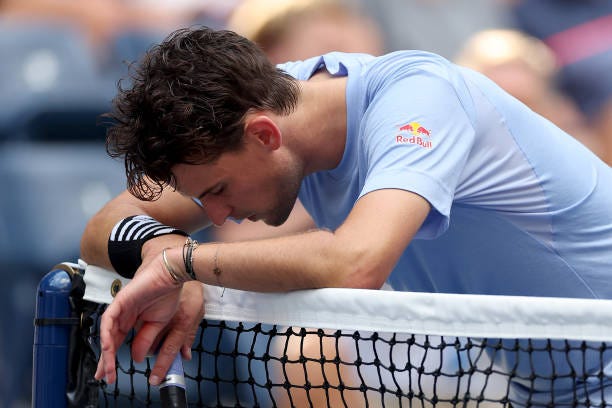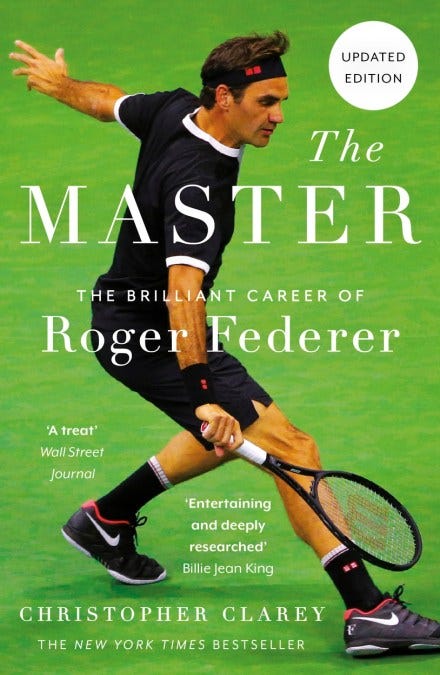Handkerchief Please
Dominic Thiem leaving too soon
**I’m experimenting with a new premium feature for paying subscribers: an audio version of this column. I’m the narrator. Please me know what you think in comments or notes. You can access the audio at the top of this piece.
What’s that upbeat line: Don’t cry because it’s over, smile because it happened?
I am struggling to apply this sound advice to Dominic Thiem. Yes, he won a major in a golden age when the gold was nearly always under lock and key. Yes, he took it to the Big Three like only a truly great player could: defeating Novak Djokovic, Rafael Nadal and Roger Federer at least five times (each!).
But those were not the first thoughts to surface when the 30-year-old Thiem confirmed this week in that modern Instagram way that 2024 will be his final season.
Instead, the gut reaction was to wince and consider what might have been.
I strive to avoid this approach in general. It’s unconstructive, right? Sports, like most things in life, offer no guarantees. Thiem certainly understood that, and if he was tempted to kid himself, all he had to do was check out the career of Juan Martin del Potro, the pure hitter and sensitive soul from Argentina. Delpo is five years Thiem’s elder, and his joy ride to the top of pro tennis got derailed by a battering ram of injuries, including one to his right wrist shortly after he won his first and only Grand Slam title at the U.S. Open.
There is dark symmetry in that.
Thiem won the title in New York in 2020 in extraordinary circumstances. The tournament was played behind closed gates with no paying public because of the coronavirus pandemic.
Federer and Nadal did not take part. Djokovic eliminated himself by being defaulted for striking a ball in frustration and inadvertently hitting a line umpire in the throat. That left quite a void, and Thiem filled it just barely by defeating Alexander Zverev in a fifth-set tiebreaker in a nerve-jangling final in which both players struggled mightily to manage the moment and the opportunity amid the cavernous emptiness of Arthur Ashe Stadium.
“The first of many Grand Slam titles,” Zverev said to his friend Thiem through the tears.
No such luck. The following June, Thiem tore ligaments in his right wrist during a grass-court tournament in Mallorca and has never been the same threat or player again.
That was not for lack of effort. Thiem took the precautions, did the rehab, gave himself time to get the magic back. Even some of his opponents were pulling for him. Little more than a year ago, Stefanos Tsitsipas beat Thiem in the second round of the Madrid Open in a high-quality thriller that ended in a third-set tiebreaker.
Tsitsipas greeted Thiem warmly at the net and reassured him: “Your best yet. You still have it. Keep going. You’ve got this.”
Tsitsipas meant well, and Thiem did keep going. But he did not get this, assuming this was a return to the elite.
Once ranked as high as No. 3, he has not been able to crack the top 70 for more than two years. He is unlikely to do so in the few months that he plans to continue on tour, although giving himself a clear finish line just might let him play and swing more freely again.
Whatever happens this season, he did get one more high: a run to the final last August in Kitzbühel in his native Austria. It was only an ATP 250 event on clay outside the main clay-court window, but it gave Thiem and many of us a false sense of possibility.
He has won only a handful of main-draw matches since then, and one of the more poignant afternoons I spent last year was attending a Babolat press event in Paris ahead of the French Open. Thiem, the faded star, appeared with Carlos Alcaraz, the new star, and all the buzz was about Alcaraz. Thiem took it in stride, as was his good-natured way. But the message was unmistakable.
This season, he has experienced more trouble with his wrist and struggled with the motivation necessary to keep globe-trotting and chasing the ghost of his former game in a grinding, Darwinian sport.
He has had enough.
“My wrist is not exactly the way it should be, and it’s not exactly how I want it, and the second reason is my inner feeling,” he said in his recorded announcement. “I was thinking about this decision for a very long time. I was thinking very carefully about it.”
His takeaway is understandable but regrettable. Thiem paid all kinds of dues, particularly at the French Open, where he lost to Djokovic in the semifinals in 2016 and then to Nadal in the semifinals in 2017 and in back-to-back finals in 2018 and 2019.
Thiem was poised to be the next champion there on his best surface when the old guard finally aged out. But his body had other plans, and, with a ranking of 117, he needed but surprisingly did not receive a main-draw wild card to play there one more time (he will have to go through qualifying).
“It’s a real shame that he’s stopping because of an injury, and not because he says, ‘I’ve played enough,’” Zverev said in Rome.
Thiem was quite a sight at his peak with his power and elasticity. He had started out with a two-handed backhand but switched to a single-hander at age 12 under the direction of his boyhood coach Gunter Bresnik. It became a gorgeous stroke, but Thiem’s forehand was the money shot and just as spectacular.
Thiem played like he practiced: at full throttle. And many were concerned that under Bresnik’s influence, he played too much and trained too hard in his early years. Bresnik wanted to build up Thiem’s resistance and resilience; make the marathon match seem routine. Mentor and mentee eventually split with Nicolas Massu taking on the coaching role in 2019 and having an immediate impact on Thiem.
But the good times did not last, and Thiem’s downbeat announcement only deepens the nostalgic mood of the 2024 tennis season. Nadal has made it plain that the end is near, without specifying exactly when the end will come. Andy Murray is on his way out, as well, possibly at the Olympics. Stan Wawrinka, a three-time Grand Slam champion like Murray, is 39 years old and ranked 87th.
Former women’s No. 1 Garbiñe Muguruza confirmed her retirement at age 30 last month in Spain. French veteran Alizé Cornet will retire after the French Open. American Danielle Collins won singles titles in Miami and Charleston after announcing that 2024 would be her final season. And how much longer will Venus Williams, who will turn 44 next month and has been a pro for nearly 30 years, want to continue as a part-time, essentially ceremonial tour player reliant on wild cards?
What is clear is that the biggest tennis stars of this era have often endured far longer than their predecessors. Federer and the Williams sisters played into their forties. Nadal is soon to turn 38. Djokovic and Murray are about to turn 37.
There are exceptions of course: none bigger than Ash Barty, who retired on top of the WTA rankings at age 25 in 2022 and has shown no indication of changing her mind.
But Thiem clearly has unfinished business even if he achieved much more than most, winning 17 career tour singles titles, including a Masters 1000 in 2019 in Indian Wells, where he defeated Federer in the final.
He also reached the Australian Open final in 2020, losing to Djokovic in a terrific five-setter.
Thiem was 5-2 against Federer and is 5-7 against Djokovic and 6-10 versus Nadal, whom he has beaten four times on clay.
Thiem deserves some sort of trophy for that feat alone, but that would not be the trophy he desired most. He came very close to it in Paris, with his swashbuckling groundstrokes and torrid work rate. But his timing was much better from the baseline than it was in the broader sense with Nadal taking up all the air and terre at Roland Garros.
“Because he’s young, he has plenty of time to win big tournaments,” Nadal said after beating Thiem in 2018. “He has everything. He’s a fighter. He has a great attitude, so that’s the most important thing.”
But Thiem has run out of time much sooner than he, Nadal or the rest of us expected.
CC
P.S. I am excited to announce that the new edition of The Master, my bestselling biography on Roger Federer, has been released in the United Kingdom. The revised version includes new chapters and material reflecting Federer’s retirement. The updated edition will also be available in some international markets, although, not as yet, in audio format.
Here’s the link to purchase. Many thanks, as always, for supporting my work.









